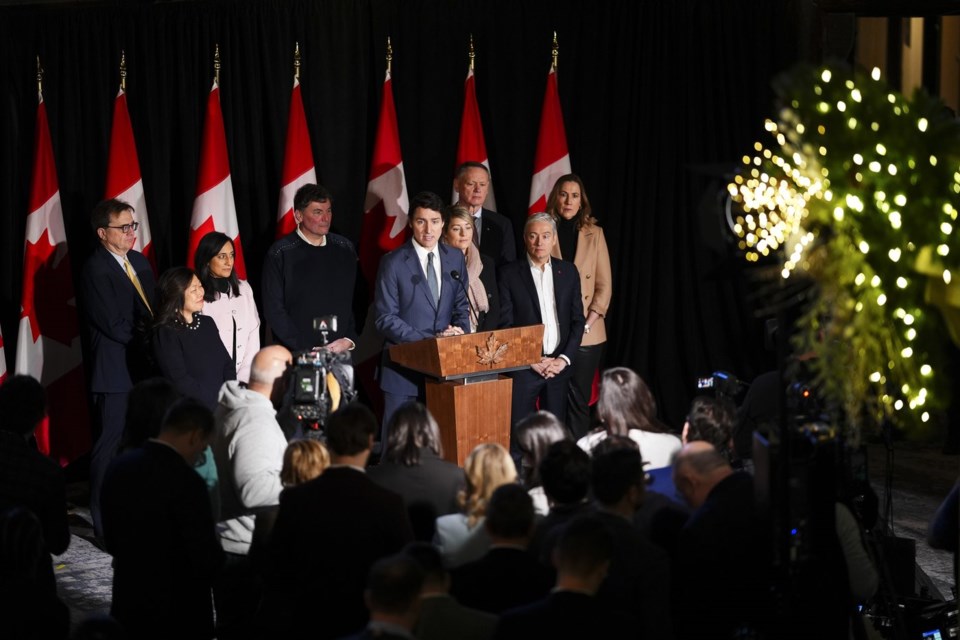MONTEBELLO, Que. — Prime Minister Justin Trudeau reached for a sales pitch instead of revealing any of his cards in his first public reply to U.S. President Donald Trump's suggestion that Canadian imports could face heavy tariffs as early as next week.
Trudeau insisted Tuesday that if Trump wants to usher in what he's called a "golden age" for the United States, he'll need the energy, critical minerals and resources that Canada is ready to provide.
"We are there to be constructive partners," Trudeau said at a federal cabinet retreat in Montebello, Que., that's focused on the Canada-U.S. trade strategy.
While Trump had been threatening to impose punishing tariffs on Canada on his first day in office, he opted instead on inauguration day to announce a plan to study alleged unfair trade practices.
The president signed an executive order directing that the study be completed by April 1. But late Monday evening, Trump mused about giving the Canadian and Mexican economies a black eye with damaging tariffs on Feb. 1.
"We are thinking in terms of 25 per cent on Mexico and Canada because they are allowing vast numbers of people — Canada is a very bad abuser also — vast numbers of people to come in and fentanyl to come in," he told reporters at the White House.
Canada's Ambassador to the U.S. Kirsten Hillman said Trump's bluster is part of his overall strategy of generating "distraction" as he seeks leverage.
"Canadians know the facts. There is no criminal trafficking of fentanyl to the United States from Canada," she said.
Trudeau also pushed back on Trump's claim, saying less than one per cent of the fentanyl and migrants entering the U.S. come from Canada. He also boasted about the $1.3 billion his Liberal government has pumped into border security to appease Trump.
But that border security plan — which includes the deployment of dozens of new drones that Public Safety Minister David McGuinty said Ottawa has bought from the U.S. — has not convinced the president to stand down.
Trudeau said Trump will be focused on moving quickly in the "extreme short term" and he suggested Ottawa is crafting its messaging to respond to that sense of urgency.
But he acknowledged there's no telling what Trump will do or say next.
"There is always going to be a certain amount of unpredictability and rhetoric coming out from this administration," Trudeau said.
The prime minister said his government's focus is still on avoiding tariffs. If that effort doesn't succeed, he said, Canada will respond and "everything is on the table."
"Our response will be robust and rapid and measured, but very strong. The goal will be to get those tariffs off as quickly as possible," Trudeau said.
The Liberals are offering few details about the plan itself, saying it will depend on what happens.
Members of the prime minister's new advisory council on Canada-U.S. relations who joined the cabinet retreat on Tuesday expressed confidence in the government's preparations for tariffs.
Flavio Volpe, president of the Auto Parts Manufacturers' Association, called for calm in the face of Trump's changing tariff timelines.
"What we don't do is panic," he said, pointing out that the executive order Trump signed on Monday instructs his government to study the trade relationship until April 1. Volpe said that is what he's putting stock in, rather than an off-the-cuff comment.
"I think we just have to get used to the fact that he's not going to change and he's not going away," he said.
Fellow council member Jean Charest said the Trump administration has a dilemma: it can either pursue "a growth agenda, or the tariff agenda, and the tariff agenda is the contrary of economic growth."
The former Quebec premier said the real conversation between the two countries will begin with a question: what does the Trump administration want, and what does Canada have to offer?
Industry Minister François-Philippe Champagne said senior Canadian officials have been busy south of the border, aggressively making the case to key lawmakers and political influencers that Americans don’t buy things from Canada out of politeness, but out of necessity.
"These supply chains have been created over decades and you cannot replace them easily in time," he said.
"If you say no to Canada — and I said that to a number of military personnel yesterday — be mindful of who you're saying yes to. You're probably saying yes to China on critical minerals, you're probably saying yes to Venezuela on crude oil."
This report by The Canadian Press was first published Jan. 21, 2025.
Sarah Ritchie and Kyle Duggan, The Canadian Press



